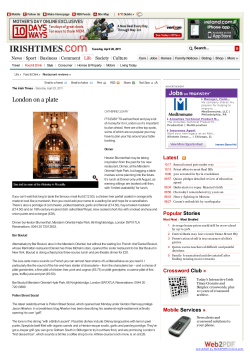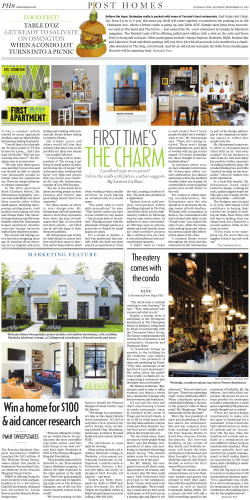
Five culinary masters with one
TopChefs Five culinary masters with one common ingredient Gordon Hamersley Hamersley’s Bistro Most Underrated Spice Cinnamon What are the essential elements of a great chef? As these snapshots of five great chefs illustrate, the answers run from soup to nuts, or when it comes to fields of study, from education to graphic arts. Their common ingredient: Boston University, which has been cooking up culinary talent for decades, sometimes in unexpected corners. The culinary arts program, started with help from America’s first top chef, Julia Child (Hon.’76), has been the launch pad for many successes, and the School of Hospitality Administration has prepared many more for rewarding careers in the big leagues of the restaurant business. How does it work? Five of BU’s best-known chefs tell us how they got from here to there. Most Versatile Meat Pork Best Kitchen Tip “Don’t open the oven door.” Most Popular Dish Roast Chicken Gordon Hamersley knows that every bistro needs a chicken dish. But hours before the grand opening of Hamersley’s Bistro in Boston’s South End, he was still scrambling to concoct one. As the clock ticked toward the opening hour, Hamersley did something he would do many times over his next twenty-two years in the restaurant business. He recalled the tastes of France — specifically, in this case, the taste of a particularly crispy chicken he had enjoyed at L’Ami Louis in Paris. Then he and sous-chef Jody Adams (who later launched Rialto in Cambridge) created a mixture of garlic, lemon, and parsley, put it in a food processor, then added mustard, shallots, herbes de Provence, salt, pepper, and olive oil, and rubbed it on the chicken. They roasted it slowly to keep the juices in and stuck it under the broiler just before serving to make it crisp. A year later, Hamersley (CGS’71, SED’74) was named one of the Best New Chefs by Food & Wine magazine. He is still serving the chicken dish today. People who lived in Boston in the 1980s know that Hamersley’s Bistro was one of the first restaurants to put Boston on the map for destination dining. And it all started when Hamersley was studying education at BU and worked part-time washing dishes at the small but formidable French restaurant Autre Chose in Cambridge. “I got out from behind the dishwasher on one lucky night and kind of never looked back,” Hamersley says. After his experience at Autre Chose, Hamersley went on to do “self-imposed apprenticeships” at several restaurants, including Wolfgang Puck’s Ma Maison in Los Angeles. It was there that Julia Child wandered into the kitchen one night to casually chat with the cooks, thus beginning a decades- By Jennifer Blaise Kramer 42 BOSTONIA Summer 2009 photograph by leah fasten Gordon Hamersley’s South End restaurant helped put Boston on the map for destination dining. long friendship. Hamersley says it was Child who urged him to open a restaurant in Boston, because she thought the city needed a Web extra good bistro Watch a video more than of chef Gordon Hamersley Los Angeles, at work at his first www.bu.edu/ choice. The bostonia. equally powerful influences of Child and extended travel in France persuaded Hamersley that the recipe for a winning restaurant was good, simple food that celebrated local ingredients and was reasonably priced. Hamersley’s Bistro did that and did it in an unpre tentious setting. Taking another cue from bistros in France, Hamersley opened a large window between his kitchen and dining room. “Most people think our kitchen is open to put us on display,” he says. “In fact, it’s the opposite. I opened it up so I could see my customers. I want my cooks to see who they’re cooking for.” Although Hamersley’s has been a James Beard Award semifinalist for the best restaurant in the coun try, and local publications routinely deliver annual Best Of plaques, the chef insists that he’s not an awards guy. “You won’t see any of that crap on our walls,” he says. “My James Beard Award is somewhere in my office, but it would take me twenty-five minutes to find it.” A New York native who arrived at BU with the intention of becoming a teacher, Hamersley teaches every day now, he says, working as he does with young chefs. “We’ve been doing the same thing for twenty years,” he says. “The biggest challenge is trying to make this place better. It makes me sharpen my skills every night.” Rocco DiSpirito Union Pacific (Closed December 2004) Most Underrated Spice Salt Most Versatile Meat Chicken Best Kitchen Tip “Taste your food incessantly.” Most Popular Dish Miso Chicken Rocco dispirito wants home cooks to have fun and to worry less about having a high-end dining experience. 44 BOSTONIA Summer 2009 As Rocco DiSpirito tells it, he started cooking when he was an eleven-yearold kid in Queens, mainly because his mother refused to give him any spending money. His first job, at Sal’s Pizzeria, made him an expert at opening tomato cans, grating cheese, and filling sodas and paid $30 a week. “I knew immediately I loved the restaurant world,” says DiSpirito (SHA’90). “Every job I had after that was in the restaurant business.” At age sixteen, DiSpirito enrolled in the Culinary Institute of America, then went on to study in Paris and cook at top New York hotels. In 1988, with ten years of cooking under his belt, he decided that a more formal education would serve him well in the increasingly competitive restaurant business. The School of Hospitality Administration offered him an accelerated two-year program, and he took it. DiSpirito emerged as a presence in the foodie universe in 1997, when he opened Union Pacific in Gramercy, and New York Times food critic Ruth Reichl gave the restaurant three stars. It also won praise from Gourmet, Food & Wine, and People, which in 2002 dubbed DiSpirito the Sexiest Chef Alive. DiSpirito was known for his fearless “focus on flavor,” evident in dishes like scallops and sea urchin with essence of tomato and mustard oil, halibut braised in goose fat with ginger, and mango and papaya carpaccio with pineapple sherbet and candied cilantro. In 2003, he went from foodie darling to household name when cameras cap tured the opening of his namesake New York City eatery for the reality series The Restaurant. The show aired for two seasons, documenting kitchen dramas, romances, and tantrums, and the chef-star rose to national fame. Then he fell. In 2004, the series fizzled and DiSpirito’s two restaurants closed. Critics accused him of selling out his considerable talent for the glamour of TV stardom. These days, DiSpirito is settled comfortably between the two: writing cookbooks and appearing regularly photograph by Trae Patton/NBCU Photobank on The Biggest Loser, Top Chef, Rachael Ray, and his own cooking program on A&E, Rocco Gets Real. He was even a contestant on Dancing with the Stars, which the Ironman triath lete says was one of the most physically demanding things he’s ever done. Today DiSpirito says he has no plans to return to the restaurant world. He is happily writing his sixth cookbook, doing charity work at food banks, and serving his mama’s meatballs to friends at home in Manhattan. His current mission, he says, is preaching the “gospel of the reformed gourmet,” which encourages cooks to worry more about having fun than having a high-end dining experience. DiSpirito wants everyone to know that it’s OK if home cooks cheat a little and pull together a quick meal. The real goal, he says, should be getting everyone around the dinner table. “No one wants to eat alone,” DiSpirito says. “It’s our last daily ritual.” Katherine Dewitt See Kingfish Hall Most Underrated Spice Cumin Most Versatile Fish Snapper Fillets Best Kitchen Tip “Think bacon.” Most Popular Dish Thai Bouillabaisse In Boston’s touristtrafficked Faneuil Hall, the seafood restaurant Kingfish Hall has earned a reputation that sets it apart from the madding crowd. The restaurant is the brainchild of BostonPhotograph by asia kepka Katherine Dewitt see’s use of adventurous flavors has led to dishes like Thai bouilla baisse and sous-vide of lobster meat. based celebrity chef Todd English, who is known for his surprising twists on traditional dishes, such as flatbread pizza with prosciutto and figs. While a guest teacher at BU, English met Katherine DeWitt See, whose broad experience in the seafood industry (from working a crab boat off the Alabama coast to upgrading technology in a shellfish processing plant in Maine) won her a Future Leader award from the National Fisheries Institute. See had already earned a master’s degree from Tufts University, where she studied agriculture and food, by the time she decided to meld her professional interests and her passion for cooking. In 2000, she enrolled in BU’s Certificate Program in the Culinary Arts. “I was part of the last class that got to cook at Julia Child’s house with Jacques Pépin,” she recalls. “And I was one of three chosen to cook. Jacques Pépin designed and illustrated the menus and gave me the signed original — that was special.” After graduating, See capitalized on the English connection she’d made at BU, applying for a job in the chef’s expanding empire and swapping her substantial business salary for a $10an-hour job as a line cook at Olives, his restaurant in Charlestown. She was quickly promoted to souschef, and in 2005 became executive chef at Kingfish Hall, a position that made good use of her knowledge of reputable seafood purveyors and the seasonality of fish. See’s knowledge of interna tional cuisine and use of adventurous combinations of flavors paid off in the creation of Kingfish special- Summer 2009 BOSTONIA 45 Geoff Gardner is inspired by the sights and smells of Champagne, Alsace, and Provence, in France. ties such as Thai bouilla baisse, which offers an Asian spin on a French standard. Her favorite dish? See says it may be her sous-vide of lobster meat, something she created for a James Beard dinner. “Imagine,” she says, “biting into a lobster tail that was fully cooked, but was as tender as sole.” In 2007, See became culinary director for Todd English Enterprises, over46 BOSTONIA Summer 2009 seeing the menus in En glish’s seafood restaurants and traveling with him to large events, where she serves as his sous-chef. She credits her success to her experience looking at the fishing industry from every angle — including from the deck of that Alabama crab boat. “The fish business has a lot of unique characters in it,” she says. “Now I’m on the other end.” Geoff Gardner Sel de la Terre Most Underrated Spice Nutmeg Most Versatile Meat Chicken Best Kitchen Tip “Assume everything is hot.” Most Popular Dish Truffled Mushroom Soup Even before he graduated from BU, Geoff Gardner had a knack for being in the right place at the right time. As an undergrad, he worked five nights a week on the cooking and prep lines in the kitchens of Boston’s legendary L’Espalier and Icarus. After graduation, he set out for places that would expand his palate, most significantly Europe, where, he says, he ate his way through France. The sights and smells in Champagne, Alsace, and Provence were as magnificent as the cuisine. Fields of lavender and gardens of rosemary and thyme made an indelible sensuous impression. After working as souschef at L’Espalier for eight years, Gardner (SHA’93) and the restaurant’s chef-owner, Frank McClelland, opened Sel de la Terre on Boston’s Long Wharf in 2000. Gard ner became part owner and executive chef, and he built a menu that he hoped would celebrate the flavors of the south of France. The restaurant serves rustic country French food, heavy on vegetables and herbs. Gardner relies on simple preparations with creative flavors, such as pan-roasted salmon with vegetable puree and a port blood orange reduction. “There’s a magical way nature provides things that work well together,” he says. If there’s a little hocuspocus involved in restaurant partnerships, Gardner’s mastered that, too: in the past two years, he and McClelland have opened two more Sel de la Terres in Massachusetts — one in Boston’s Mandarin Oriental hotel, where it shares top billing with Gardner’s re cently relocated launching pad, L’Espalier, and one in Natick. Still, Gardner gives a lot of credit to a principle he photograph by kathleen dooher learned at SHA: hospitality. “I think people get caught up in the minutiae of their businesses and don’t see the big picture: everything we do is about making guests happy,” he says. “Know how to make your customers happy. I learned that at BU.” Peter Brett Circle Bistro, Notti Bianche Most Underrated Spice Cardamom Most Versatile Fruit Lemon Best Kitchen Tip “Vanilla and lemon are the salt and pepper of the pastry kitchen.” cakes. It was, he says, a labor of love, and it was rewarded with high praise from publications like the Washingtonian and the Washington Post, which called his cheesecake the dreamiest in town. Brett’s dessert philoso phy blends the classics — such as chocolate — with whatever is fresh and excit ing. “I do one chocolate dessert at each restaurant, but I don’t go overboard,” he says. “I prefer a fruit dessert with whatever’s in season. In my profession you never get bored, because the seasons always change.” At Circle Bistro and Notti Bianche, the menu changes every six to eight weeks to take the best advantage of the local produce Brett gets from a nearby organic farm. One constant, though, is his signature chocolate bread pudding with chocolate sorbet — “very creamy and light,” he says, “and the sorbet is an adult version of a Fudgsicle.” Even with taste para mount, art is never far be hind. In 2006, he launched his own wedding cake business, called Peter Bakes, where he turns out colorful, multitiered concoctions draped in gilt roses and fondant vines. And he was recently one Web extra of fifteen chefs BU alumni asked to create chefs share a log-cabintheir recipes at themed cake for www.bu.edu/ last February’s bostonia. Lincoln Bicentennial celebration at the Lincoln Memorial, attended by members of Congress and the president. His contribution? A cake made of red marzipan logs and a blue fondant roof, sprinkled with white stars. p Most Popular Dish Chocolate Bread Pudding with Chocolate Sorbet How does a major in graphic design lead to a career as a pastry chef? Peter Brett, whose daily efforts fulfill the sweetest dreams of diners at Wash ington, D.C.’s Circle Bistro and Notti Bianche, knows that when it comes to des serts, appearances count. “My art training has helped me make things pleasing to the eye in terms of composition, color, and arrangement,” says Brett (CFA’76). He says he has loved to bake since his childhood in Rhode Island and would have forgone the design detour if he had believed that anyone would pay him to do what he loved. After graduating from L’Academie de Cuisine in 1989, where he studied under White House pastry chef Roland Mesnier, Brett spent the next fifteen years working in hotels, among them the Tabard Inn and Park Hyatt, baking pastries, desserts, even wedding photograph by chris hartlove Peter Brett’s training at the College of Fine Arts has helped him create desserts that are pleasing to the eye. Summer 2009 BOSTONIA 47
© Copyright 2026











